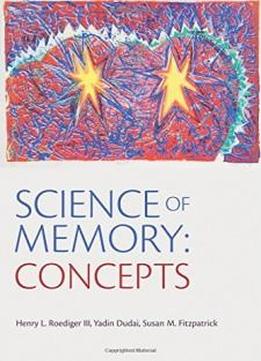
Science Of Memory Concepts
by Yadin Dudai /
2007 / English / PDF
1.5 MB Download
Scientists currently study memory from many different perspectives:
neurobiological, ethological, animal conditioning, cognitive,
behavioral neuroscience, social, and cultural. The aim of this book
is to help initiate a new science of memory by bringing these
perspectives together to create a unified understanding of the
topic. The book began with a conference where leading practitioners
from all these major approaches met to analyze and discuss 16
concepts that are crucial to our understanding of memory. Each of
these 16 concepts is addressed in a section of the book, and in the
66 succinct chapters that fill these sections, a leading researcher
addresses the section's concept by clearly stating his or her
position on it, elucidating how it is used, and discussing how it
should be used in future research. For some concepts, there is
general agreement among practitioners from different fields and
levels of analysis, but for others there is general disagreement
and much controversy. A final chapter in each section, also written
by a leading researcher, integrates the various viewpoints offered
on the section's concept, then draws conclusions about the concept.
This groundbreaking volume will be an indispensable reference for
all the students and researchers who will build upon the foundation
it provides for the new science of memory.
Scientists currently study memory from many different perspectives:
neurobiological, ethological, animal conditioning, cognitive,
behavioral neuroscience, social, and cultural. The aim of this book
is to help initiate a new science of memory by bringing these
perspectives together to create a unified understanding of the
topic. The book began with a conference where leading practitioners
from all these major approaches met to analyze and discuss 16
concepts that are crucial to our understanding of memory. Each of
these 16 concepts is addressed in a section of the book, and in the
66 succinct chapters that fill these sections, a leading researcher
addresses the section's concept by clearly stating his or her
position on it, elucidating how it is used, and discussing how it
should be used in future research. For some concepts, there is
general agreement among practitioners from different fields and
levels of analysis, but for others there is general disagreement
and much controversy. A final chapter in each section, also written
by a leading researcher, integrates the various viewpoints offered
on the section's concept, then draws conclusions about the concept.
This groundbreaking volume will be an indispensable reference for
all the students and researchers who will build upon the foundation
it provides for the new science of memory.







![German Grammar In Context (Languages In Context) (English And German Edition) [English, German]](/media/uploads/2020/5/german-grammar-in-context-languages-in-context-english-and-german-edition-english-german.jpg.147x205_q85.jpg)



